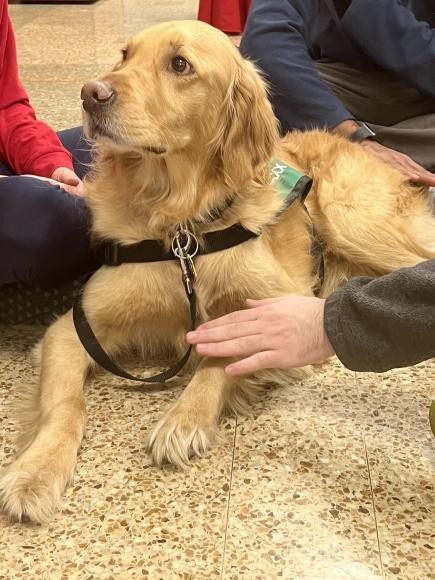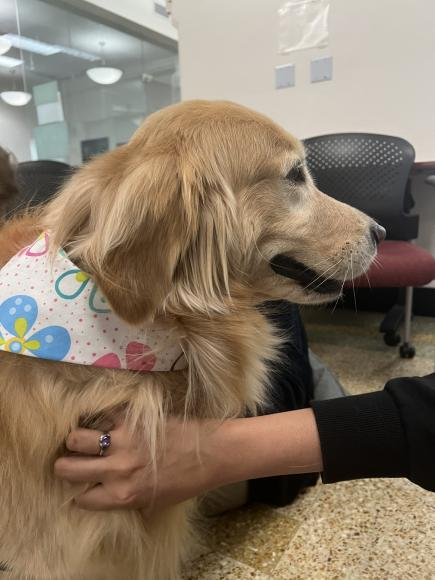Need a stress reliever? ‘Dog Days with the Dean’ offers weekly pet therapy

Hannah Palmisano
Therapy dog Maxx at the the University of Arizona Dean of Students Office’s “Dog Days with the Dean” weekly pet therapy event. Check out the event every Wednesday from 11 a.m. to 1 p.m. in the Nugent Building.
March 9, 2023
The University of Arizona Dean of Students Office hosts a weekly event called “Dog Days with the Dean” in hopes of relieving student stress and increasing morale through pet therapy.
Hosted every Wednesday from 11 a.m. to 1 p.m. in the Nugent Building, which is across from the Student Union Memorial Center, the Dean of Students Office partners with Pet Partners of Southern Arizona and the Humane Society to bring animals for students to connect with.
According to Chrissy Lieberman, the associate dean of students, the program started roughly around 2012 as a once-a-semester event before it soon escalated to once-a-week. The initial motivation for creating this event was to get students to come into the Dean of Students Office before they needed to in order to make them aware of how the office can support them.
“We also did something called ‘Wind Down Wednesday,’ and we were doing things like Ben’s Bells and just different things to bring students in, but the dogs were by far the most popular,” Lieberman said.
How “Dog Days with the Dean” works is that students can come inside the Nugent Building and, after swiping their CatCard, they are taken to a back room space where they are introduced to a variety of dogs they can pet and play with.
“It really is as simple as showing up. You can talk to the people who are bringing the dogs; you can talk to other students. We had chairs out, but most people just get on the floor with the dogs,” Lieberman said.
The costs of running the program are relatively low, according to Lieberman. Pet Partners and the Humane Society (through their Pet VIP program) volunteer their services to the UA campus, so besides paying for their parking, organizing the set time on Wednesday and liability insurance (which the organizations also come with), it costs very little.
Even though the event is called “Dog Days with the Dean,” the program has also brought on other kinds of animals besides dogs, including horses, cats, ponies, goats, etc.
“Any animal that has passed the neutrality test and can handle this environment, we would love to have,” Lieberman said.

Diane Korn and Diane Alexander, two Pet Partners volunteers, explained how pet therapy works and how their organization this type of treatment throughout Southern Arizona.
According to the Pet Partners website, “[they] believe that the human-animal bond is a mutually beneficial relationship that improves the physical, social, and emotional lives of those [they] serve. [They] are motivated by connection, compassion, and commitment to sharing this meaningful bond with everyone who can benefit from time spent with an animal.”
Pet handlers, who are also volunteers of Pet Partners, first go through a handler’s course and then must go through a 20-part evaluation in order to be registered to work with Pet Partners, according to Alexander, who also coordinates the evaluation.
“Certification implies an outside third party doing the testing, and we self-test. So, we use the term registration. It is essential people understand it as certification,” Alexander said.
Pet therapy programs like “Dog Days with the Dean” are shown to be crucially needed in college settings, especially at the UA. According to the 2022 Health & Wellness Survey, compiled by UA Campus Heath, about 41.9% of students felt so depressed that it was hard to operate, 62.4% of students were overwhelmed with anxiety and 49.7% of students felt things were hopeless, all since August 2021.
“There are studies that show that certain hormone levels either raise or lower depending on what’s going on. I think cortisol, which is a stress hormone, when you’re petting a dog lowers it. [It] can also lower blood pressure,” Alexander said.
According to an article on a study from the North American Journal of Psychology, “therapy dogs have been shown to significantly reduce stress” and “college students who held a cat or dog unfamiliar to them had a decrease in diastolic blood pressure, suggesting that the simple presence of a cat or dog can impact one’s physiologic response.”
“The oxytocin, which is the feel good hormone that bonds mothers with babies, is mutually released with those who are interacting with the animals and in the animals themselves,” Korn said.
UA freshmen Maddie Reel and Janae James heard about “Dog Days with the Dean” when they both attended Bear Down Camp. Reel has been attending this event since the first week of school last semester and James has been attending since the middle of her first semester.
“It’s just relaxing for me personally to hang out with the dogs, and it’s a good break from school,” Reel said. “It’s nice because you miss your dogs from home, especially being out-of-state.”
“Dog Days with the Dean” isn’t the only pet therapy program on campus, and many other university organizations such as UA Counseling & Psychological Services, the Honors Village, SALT center, the Main Library, etc., also partner with Pet Partners and other similar organizations to hold events similar to what the Dean of Students Office does.
Pet Partners is also always looking for volunteers to help out with evaluations which occur monthly.
“It’s a great opportunity for them to just be off campus and be around animals and people that love animals, and it’s very interesting for them to just watch the process, and then they get to interact with the animals as well,” Korn said.
If students are interested, they can contact Diane Korn at diane81@me.com.
Follow Tereza Rascon on Twitter


